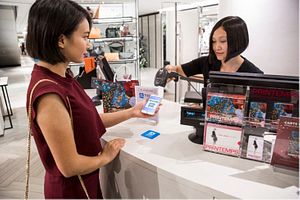Since Facebook announced its new digital currency project “Libra,” it has faced fierce pushback from global regulators and financial sectors. Libra, designed with an associated global payment system, has the ambition to make monetary transactions as convenient as messaging for billions of people worldwide.
Libra is joining a global online payment revolution led by China, where nearly half of the world’s digital payments are made. QR codes have conquered China’s stores, restaurants, and public transportation for instant payments; using cash and credit cards is obsolete. Mobile payment platforms such as Alibaba’s Alipay and Tencent-backed WeChat Pay generated 81 trillion yuan in transactions ($12.8 trillion) last year.
“China is probably the one place where digital payment has already been achieved at real massive scale,” said Shiv Putcha, principal analyst at tech research firm Mandala Insights in Mumbai.
While Libra is still struggling to get governments’ approval to launch, many of its aspirations have already been realized by companies in China — and so have some of the concerning impacts warned about by lawmakers.
In east China’s Nantong city, Liangliang Huang, 31, no longer carries cash or a credit card with her when going out. From ordering meals to buying Starbucks coffee to purchasing groceries in markets, she pays by simply scanning a QR code. Living cash-free has become prevalent among Chinese cities, and it’s not a privilege unqiue to young people, Huang said. “My parents, who are over 50, also live their lives on Alipay and WeChat Pay. It’s much easier than using cash or cards.”
For merchants, what’s more appealing about digital payment is the low cost. Chinese banks charge retailers credit card swipe fees of 0.5 percent to 0.6 percent of each transaction. By contrast, the rate for mobile wallets is as low as 0.1 percent, and sometimes even feeless. Merchants also gain from quick checkouts, easy setup, and low risk of receiving fake currency.
The beneficiaries are not only those living in major big cities; residents in the country’s vast less-developed areas are also taking part. A recent joint survey by Fudan, Nanjing, and Renmin Universities found that the majority of small and micro enterprises in China’s fourth- and fifth-tier towns mainly rely on digital apps for daily transactions. Cash contributed to less than 10 percent of payments of the surveyed businesses, many of which can’t afford to get a card reader.
“It allows a great level of financial inclusion,” said Aaron Klein of the Brookings Institution. “You don’t need a bank account to be part of the system.” In China, even beggars are replacing their tin cups with QR codes to get donations.
For Facebook’s Libra, such advantages could be even magnified for international consumers. “Imagine somebody in India or Bangladesh is working in the U.K. and is sending money home,” Putcha said. In theory, Libra users can make cross-border transfers in real-time, with almost no fees – the current global average cost of sending a $200 remittance is $14, according to the World Bank. “It has a very compelling vision for the people,” Putcha said.
But there are flip sides too. China’s banking system has suffered overwhelming impacts and lost a large portion of revenue to the new ecosystem, according to Klein. “Alipay and WeChat Pay have taken large positions in dominating retail payment, which has historically been a strong revenue producer for banks.”
Jianning Zhang, a senior manager of a state-owned bank branch in Zhongshan, Guangdong province, echoed the statement. Since digital payment was commonly adopted in the city in 2015, his bank has lost “about half of credit card revenue,” which previously contributed one-eighth of total revenue. Interest revenue from small-scale loans was also affected, since more people are turning to the small loans available on the payment apps with merely one click.
What’s worse is that banks are losing track of their customers, as consumer data goes directly to Alipay and WeChat Pay’s system, not the banks’ database. “When consumers swipe our credit cards, we get information about where and what transaction they made. With data analytics techniques, we can match them with targeted financial services to create new revenue,” said Zhang.
On a national level, the loss can have a broader ripple effect across the county’s economy, as Putcha pointed out: As more deposits and revenue are swallowed up by online payment platforms, banks and the central bank would become short of funding to invest in projects and loans to industries. The Libra system poses even greater risks to banks since it, unlike Alipay and WeChat Pay, which are still tied to people’s bank accounts, is designed as an alternative to the existing banking system and local currencies.
New market forces have accelerated the reform of Chinese banking services, Zhang said. New changes are taking place in major state-owned banks, such as adopting artificial intelligence technology and improving service quality, according to Zhang. “We strive to provide personalized services to win back our customers.”
Although Libra has the potential to shake up the world’s financial system and reshape billions of people’s payment habits, the impacts would take years to come. Unlike many Chinese financial technology advances, which prospered under authorities’ policy green lights, the global project has to clear huge regulatory hurdles and obstacles already set up in multiple countries, said Putcha.
Dongyao Nie is a news researcher at Al Jazeera English based in Washington DC.

































